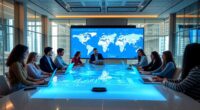El Salvador's decision to fast-track a new Bitcoin law signals a significant shift in its approach to cryptocurrency regulation. By aligning with the IMF's requirements, the government seeks to introduce the Digital Assets Issuance Law, enhancing transparency and compliance. This move could reshape the landscape of digital assets in the country. But what does this mean for the future of Bitcoin integration and the wider economic implications?

When El Salvador made history by recognizing Bitcoin as legal tender on September 7, 2021, it aimed to enhance financial inclusion for its unbanked population and lower remittance fees. This bold move, approved by the Legislative Assembly on June 9, 2021, positioned El Salvador as the first country to adopt a cryptocurrency as legal tender. The government believed that by integrating Bitcoin into the economy, they could attract foreign investment and stimulate economic growth, but the path has been anything but smooth.
The implementation of this groundbreaking law faced significant challenges. The government's official wallet, known as Chivo, encountered technical issues right from its launch, leading to frustration among users. Additionally, Bitcoin's notorious price volatility raised concerns and sparked protests from citizens worried about economic instability.
While the law initially mandated that merchants accept Bitcoin, it later shifted to a voluntary basis due to conditions set by the International Monetary Fund (IMF). This change was crucial for securing a $1.4 billion loan from the IMF, underscoring the delicate balance the government had to maintain between innovation and economic stability.
As you consider the financial implications, it's essential to note that Bitcoin was intended to reduce fees associated with international remittances, which are a lifeline for many Salvadorans. With about 70% of the population lacking bank accounts, the government aimed to promote financial inclusion. However, the mixed results of this initiative reflect the complexities of introducing a volatile digital currency into a developing economy. The IMF's loan conditions also necessitated changes to Bitcoin policies, further complicating the situation.
In response to these challenges, El Salvador's government has made regulatory and policy adjustments. The introduction of the Digital Assets Issuance Law (LEAD) enables the tokenization of real-world assets and stablecoins, aiming to enhance the regulatory framework surrounding digital currencies.
Recent reforms focus on anti-money laundering and regulatory transparency, signifying a move towards a more structured approach to cryptocurrency. Despite the limitations imposed by the IMF agreement, such as the requirement to pay taxes in US dollars, the government continues to accumulate Bitcoin for strategic reserves.
Ultimately, while El Salvador's Bitcoin law has sparked a global conversation about cryptocurrency and its place in modern economies, the journey ahead remains fraught with challenges. You can see that the balancing act between fostering innovation and ensuring economic stability will be crucial for the country's future.









